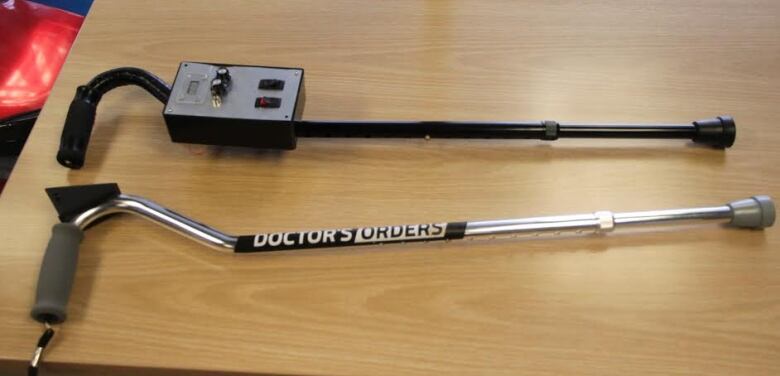Smart Cane lets patients know when they are walking properly
Cane collects data and vibrates when weight isn't distributed correctly
The cane has evolved little over the millenia that humans have used sticks to aid with walking woes, but a New Brunswick developer is giving the walking stick an upgrade.
Loaded with pressure sensors and wireless online connectivity the Smart Cane aims to bring detailed information about how recovering patients and life long users of canes are using, or misusing, the mobility assistant.
"It measures loading characteristics, stability, and orientation while the patient is using the cane," says co-creator of the Smart Cane,Graeme Powell. "It tells us how they are using the cane."
Powell, 29, is the CEO of the fledgling company Doctors Orderthat he founded to produce the Smart Cane.
"Recovering patients need to reduce the amount of weight on the limb, whether it be knee surgery or another lower limb issue," says Powell. "But they also need to put a little bit of weight on it to stimulate bone growth and reduce the muscle loss."
"It's a balancing act, and this tells you how much or how little weight you need."
The cane will vibrate, like a cell phone, to warn patients when they are distributing their weight incorrectly. All the data collected made available to doctors and patients alike.
"It monitors what the patients are doing and it gives them immediate feedback so they can take control of their recovery," says Powell. "It provides medical professionals the information to know exactly what the patients are doing to improve their recovery."

Powell says that when patients, such as those recovering from a hip replacement, place their weight incorrectly on a walking aide they risk doing more damage.
"By allocating more weight than necessary to the hip takes more pressure in the wrong places it can wear out your other hip faster," says Powell.
"Or it can lead to more surgeries. This can reduce the costs on the health care system through prevention."
Chris McGibbon is the research chair in rehabilitation biomechanics at the Institute of Biomedical Engineering at the University of New Brunswick. He oversees Powell's project and says the more detailed the data the better.
"Having more data is typically always better," says McGibbon. "Because there is always going to be those circumstance where down the road you say 'boy, I wish we collected data on that' so we're obviously striving to collect as much information as we possibly can."
Powell's canes are prototypes right now. He's stilldeveloping them with the hope that they will be in the hands of patients sometime next year.













_(720p).jpg)


 OFFICIAL HD MUSIC VIDEO.jpg)
.jpg)



























































































